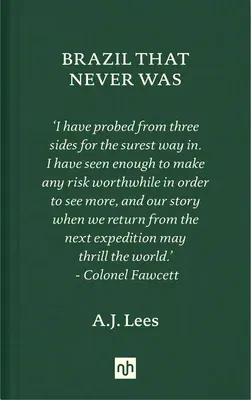A famed British neurologist embarks on an expedition in Brazil to
follow the trail of Percy Fawcett, an occult-obsessed explorer who went
missing in the Amazon rainforest and was the subject of the 2016 film
The Lost City of Z.
As a boy growing up near Liverpool in the 1950s, Andrew Lees would visit
the docks with his father to watch the ships from Brazil unload their
exotic cargo of coffee, cotton bales, molasses, and cocoa. One day, his
father gave him a dog-eared book called Exploration Fawcett. The book
told the true story of Lieutenant Colonel Percy Fawcett, a British
explorer who in 1925 had gone in search of a lost city in the Amazon and
never returned. The riveting story of Fawcett's encounters with deadly
animals and hostile tribes, his mission to discover an Atlantean
civilization, and the many who lost their own lives when they went in
search of him inspired the young Lees to believe that there were still
earthly places where one could "fall off the edge."
Years later, after becoming a successful neurologist, Lees set off in
search of the mysterious figure of Fawcett. What he found exceeded his
wildest imaginings. With access to the cache of "Secret Papers," Lees
discovered that Fawcett's quest was far stranger than searching for a
lost city. There was a "greater mission," one that involved the occult
and a belief in a community of evolved beings living in a hidden
parallel plane in the Mato Grosso.
Lees traveled to Manaus in Fawcett's footsteps. After a time-bending
psychedelic experience in the forest, he understood that his yearning
for the imaginary Brazil of his boyhood, like Fawcett's search for an
earthly paradise, was a nostalgia for what never was. Part travelogue,
part memoir, Lees paints a portrait of an elusive Brazil, and of a
flawed explorer whose doomed mission ruined lives.

